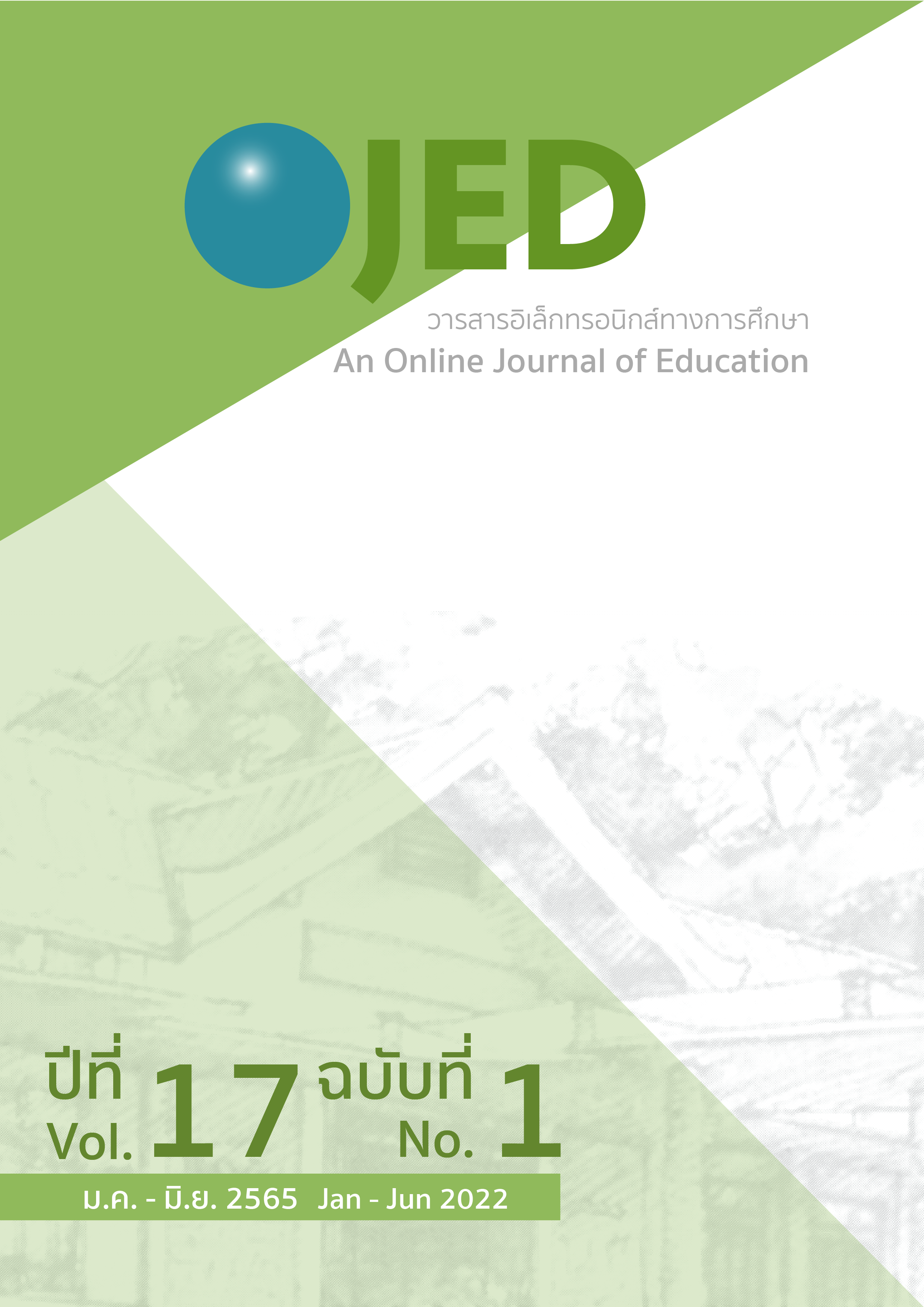Effects of Genre-Based Approach with Graphic Organizers on Argumentative Writing Ability of EFL Secondary School Students
DOI:
https://doi.org/10.14456/ojed.2022.22Keywords:
genre-based approach, graphic organizers, argumentative writingAbstract
The objectives of this study were 1) to investigate EFL students’ writing ability after implementing a genre-based approach with graphic organizers on argumentative writing, and 2) to explore EFL students’ perceptions toward a genre-based approach with graphic organizers on argumentative writing. The sample consisted of 30 eleventh grade students from a public school in Nakhon Nayok who had enrolled in an English Mastery course. The study employed a one-group pretest-posttest quasi-experimental design to measure the effects of the instruction. The data were collected both quantitatively and qualitatively by using a written pretest and posttest, a questionnaire, and a semi-structured interview. A paired-sample t-test was then used to compare the students’ abilities before and after the treatment. The data from the questionnaire and interview were analyzed using mean, standard deviation, and content analysis. The findings revealed that the students’ argumentative writing ability significantly improved after the implementation of this approach at the .05 level of significant and students had positive perceptions of this form of writing instruction.
References
Anderson, C. E., Mora González, C. A., & Cuesta Medina, L. M. (2018). Graphic organizers support young L2 writers’ argumentative skills. GiST Education and Learning Research Journal, (17), 6–33. https://doi.org/10.26817/16925777.433
Bakry, M., & Alsamadani, H. (2015). Improving the Persuasive Essay Writing of Students of Arabic as a Foreign Language (AFL): Effects of Self-Regulated Strategy Development. Procedia - Social and Behavioral Sciences, 182, 89-97. https://doi.org/10.1016/j.sbspro.2015.04.742
Berveniku, D. (2017). The art of argumentation: A sociolinguistic approach to developing thesis statements (the case of Kosova high school students). Eurasian Journal of Applied Linguistics, 3(2), 271-286. https://doi.org/10.32601/ejal.461018
Best, J., & Kahn, J. (1998). Research in education. Allyn and Bacon.
DiCecco, V., & Gleason, M. (2002). Using graphic organizers to attain relational knowledge from expository text. Journal of Learning Disabilities, 35(4), 306-320. https://doi.org/10.1177/00222194020350040201
Dirgeyasa, I. (2016). Genre-based approach: What and how to teach and to learn writing. English Language Teaching, 9(9), 45. https://doi.org/10.5539/elt.v9n9p45
Ellis, E., & Howard, P. (2005). Graphic organizers: Power tools for teaching students with learning disabilities. Graphic Organizers and Learning Disabilities, 1, 1-5.
Hasani, A. (2016). Enhancing argumentative writing skill through contextual teaching and learning. Educational Research and Reviews, 11(16), 1573-1578. https://doi.org/10.5897/ERR2016.2806
Hughes, M., Regan, K., & Evmenova, A. (2019). A Computer-based graphic organizer with embedded self-regulated learning strategies to support student writing. Intervention in School and Clinic, 55(1), 13-22. https://doi.org/10.1177/1053451219833026
Hyland, K. (1990). A genre description of the argumentative essay. RELC Journal, 21(1), 66-78. https://doi.org/10.1177/003368829002100105
Hyland, K. (2004). Genre and second language writing. University of Michigan Press.
Jantasin, P. (2015). Effects of Writing Instruction based on Toulmin Model in Flipped Learning Environment on Argumentative Writing Ability of Undergraduate Students [Master’s thesis]. Chulalongkorn University.
Kettrachon, I. (2008). Effects of Writing Instruction by Genre-based Approach on the Creative Essay Writing Ability and Creative Thinking of Eleventh Grade Students [Master’s thesis], Chulalongkorn University.
Kitvilairat, P. (2016). Effects of Argumentative Writing Instruction Using Genre-Based Approach and Critical Thinking Framework on Argumentative Writing Ability of Upper Secondary School Students [Master’s thesis], Chulalongkorn University.
Kongpetch, S. (2006). Using a Genre-based approach to teach writing to Thai students: A case study. Prospect, 21(2), 3-33.
Lam, Y. W., Hew, K. F., & Chiu, K. F. (2017). Improving argumentative writing: Effects of a blended learning approach and gamification. Language Learning & Technology, 22(1), 97–118. https://dx.doi.org/10125/44583
Martin, J. R., & Rose, D. (2005). Designing literacy pedagogy: Scaffolding asymmetries. In J. Webster, C. Matthiessen & R. Hasan (Eds.), Continuing Discourse on Language (pp. 251-280). Continuum.
Mauludin, L. (2020). Joint construction in genre-based writing for students with higher and lower motivation. Southern African Linguistics and Applied Language Studies, 38(1), 46-59. https://doi.org/10.2989/16073614.2020.1750965
O’Hallaron, C. (2014). Supporting fifth-grade ELLs’ argumentative writing development. Written Communication, 31(3), 304-331. https://doi.org/10.1177/0741088314536524
Regan, K., Evmenova, A., Good, K., Legget, A., Ahn, S., Gafurov, B., & Mastropieri, M. (2017). Persuasive writing with mobile-based graphic organizers in inclusive classrooms across the curriculum. Journal of Special Education Technology, 33(1), 3-14. https://doi.org/10.1177/0162643417727292
Shabani, K., Khatib, M., & Ebadi, S. (2010). Vygotsky's zone of proximal development: Instructional implications and teachers' professional development. English Language Teaching, 3(4). https://doi.org/10.5539/elt.v3n4p237
Srijan, A. (2020). The development of English learning management by using graphic organizer to develop writing skill for mattayomsuksa 2 students. Journal of Educational Technology and Communications, 3(8), 23-30.
Styati, E., & Irawati, L. (2020). The effect of graphic organizers on ELT students’ writing quality. Indonesian Journal of EFL and Linguistics, 5(2), 279. https://doi.org/10.21462/ijefl.v5i2.283
Tongjean, W., Chusanachoti, R., & Makanong, A. (2019). Development of an instructional model based on inquiry-based learning and 360 degree feedback approaches to enhance English argumentative writing ability of undergraduate students. Journal of Education Studies, 47(3), 361-383.
Trisusana, A., & Susanti, A. (2020). Graphic organizers for students’ descriptive and narrative writing. Advances in Social Science, Education and Humanities Research, 491, 961-966.
Visser, P. (2017). Effects of the genre-based writing instruction module in a blended learning environment on English writing ability and thinking skills of Thai undergraduate students [Master’s thesis]. Chulalongkorn University.
Downloads
Published
How to Cite
Issue
Section
License
Copyright (c) 2022 An Online Journal of Education

This work is licensed under a Creative Commons Attribution-NonCommercial-NoDerivatives 4.0 International License.




